Nick Laird-Clowes on his score for Marianne & Leonard: Words of Love
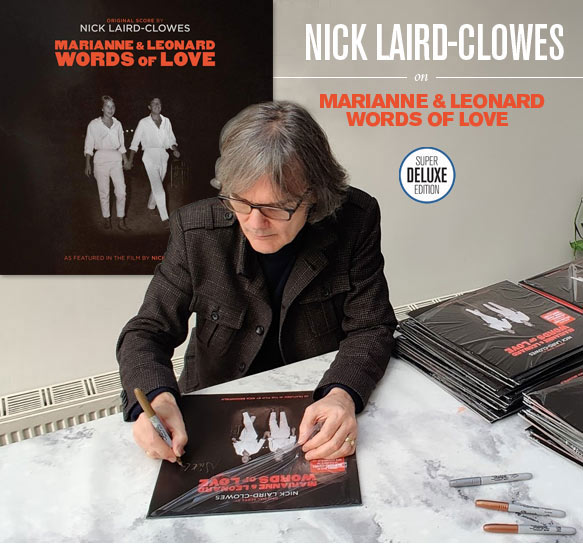
Nick Laird-Clowes is best known for fronting eighties pop band The Dream Academy. In the nineties he co-wrote two songs on Pink Floyd‘s The Division Bell and in recent years has been writing and recording music for films, notably enjoying a fruitful partnership with documentary maker Nick Broomfield.
Broomfield’s most recent film was this year’s acclaimed Marianne & Leonard: Words of Love – about the relationship between Marianne Ihlen and Leonard Cohen – for which Nick Laird-Clowes wrote and performed the music. The full score has been released on vinyl and Nick dropped into SDE last week to discuss this work and to sign a few albums…
SuperDeluxeEdition: Was it Nick Broomfield’s idea not to use Leonard Cohen’s music for the soundtrack of ‘Marianne & Leonard: Words of Love’?
Nick Laird-Clowes: I’m not 100 percent sure, but he’d just done the Whitney Houston project [2017’s ‘Whitney: Can I Be Me’] and there had been a big problem with the family… with the estate of Whitney… a lot of legal action, and I think he didn’t want anything to do with having to ask someone how to make his film. Because he has a very single-minded approach. Nick said “Leonard speaks in a very poetic way and if you put music to it, I feel it will be as good as Leonard Cohen songs,” and it really is! He’s got such an amazing voice and an amazing point of view. In this age of fake news and lies… Leonard Cohen, from the earliest age in this film, he goes overboard to tell the truth, even if it’s going to do him down, in some way. He was an incredible man, wasn’t he? With an incredible life.
SDE: Were you already a big fan?
NLC: Huge. I’d seen him play lots and lots of times…
SDE: Did you ever meet him?
NLC: No, sadly not. In the mid-period when I went to see him in the Albert Hall, in the early 80s, when he sang “I was born with the gift of the golden voice…” we were laughing, as you would, but people were going “shssh” – they didn’t want to find him funny at all. But he was a very funny man.
SDE: I actually read one of his books when I was in my late teens…
NLC: [laughing] You’ve read Beautiful Losers!? I’ve got the poetry books. I’ve read everything except ‘Flowers For Hitler.’ The poetry books are incredible.
SDE: So what was the process then, for the music? Did you wait for a rough cut of the film before you started or were you already working with ideas, once Nick had asked you to do it?
NLC: This was the third-and-a-half film of his I’d worked on and because we’d done Whitney very, very quickly the year before, he sent me an email late in the night saying “I’m doing a film on Leonard Cohen. I wonder if you could write me a couple of things I could start cutting to.” The next day I started, and I just wrote two pieces and I sent them and he said “thank you very much” and they started cutting them in and they turned out to be the two main pieces. But he wrote back and said “can you send me some things that are a bit less depressing” [laughs]. It’s Leonard Cohen! So I wrote him a couple of other things, but I don’t think he used either of them. He used these two pieces (‘Words of Love’ and ‘Marianne & Leonard’) everywhere.
But then there was a screening in this old mill house and over lunch I think, we started talking about the music. I said “you’ve cut these two in, they’re working great…maybe we’re done!” [laughs]. Nick said “Oh, no I want to experiment” and went on to say that women were so important in Leonard’s life, so I said let’s try some girl singers, I’d love to write some parts. So I wrote the parts for Beautiful Losers and Marianne & Leonard – which are the two main guitar themes that I’d written – and I worked with Melanie Pappenheim, who sings with Brian Eno and lots of other people. She came in and nailed it – she was brilliant.
We were thrilled and we sent it to Nick who said he was really pleased, but within a couple of days he said “it’s fighting my dialogue – I can’t use it.” This is where films and making records is different. It was a gloomy thing and I felt it was the best piece in the damn thing, but with films you have to take it on the chin. So I actually got here to do something much simpler, but thankfully he didn’t use it. In the end he went back to the acoustic tracks. Nine months later – we were in contact all the time – he says he’s screened the film in Hydra under the moonlight and people loved the music, but “we’ve put back something you didn’t really like, that got lost along the way…” [laughs]. I said “is it the piece with the girl singer?” and he says “no, no, it’s something you wouldn’t know. I don’t think you were very keen on it.” Anyway, I go to the premiere and there is the restored girl vocal with over bits where there’s not much dialogue. And it closes the picture, when the credits role. That was another great thing of Nick Broomfield coming good in the end… I’ve had it before.
SDE: And the female backing vocalist is very evocative of Cohen’s own work, of course. He liked that ‘angelic’ type of vocal
NLC: Yes. I love that. I’ve always loved that. It works very well with the low voice.
SDE: So did you know that this was going to become an official soundtrack album, because the Whitney one didn’t come out, did it?
NLC: No. Usually they don’t. Often there’s not enough to justify it. So much music these days in film is ‘drone’ – not so much with Nick, but in a lot of other scores, post Hans Zimmer, there’s this kind of sound [Nick hums a drone sound] everywhere and melodies are not prized. But I don’t come from that, I come from a melody place, really, and shortly before the film came out I was saying to Nick that there’s a lot of pieces in it that he got me to write, to score for the film, that weren’t acoustic guitar, that were piano-driven pieces, that he uses, but not that much. So I asked him if he’d let me try and get an album deal on it. And he said “I’d love that. I love this music.” Then I went to the premiere, I talked to Universal Music and started getting it out to different people and in the end Warners agreed to do it on vinyl. That’s quite important to me because all my Leonard Cohen stuff is on vinyl!
SDE: What is the music industry like, from your perspective, these days?
NLC: It’s incredible. I was on Warner Bros with The Dream Academy, from 1984, I reckon we probably signed. We were an unusual band in terms of what else was going on in the music industry… it wasn’t funk, it wasn’t Duran Duran or something like that. But we finally got signed to Warner Bros in America. They had Prince, Madonna, Neil Young, R.E.M.. they have everything great that I loved – well maybe not Madonna so much [laughs] – but when they signed us, they said “you can make three albums for us. We are committed to that. And don’t try and write a hit single on your first album because you’ve got three albums to go.” So no pressure, although ‘Life In A Northern Town’ was the first single and it was a hit! Not only did they give us the three albums, but every year – and these were giants… Mo Ostin put Reprise together for Sinatra….giants of the industry… but every year when they came here [to the UK] they’d call: “Nick, we’re here for Wimbledon, shall we have dinner?” And we’d sit and talk about stuff. They’re STILL in my life. Because we can all talk music, which is what we love.
The difference now is that I’ve never met any of the people at Warner Bros. Nobody’s asked me in to meet them. I’ve have had lots of email friendship/correspondence. When I say to people, sometimes, “this is taking so long,” I get told there’s one person doing the job that ten people used to do. So I don’t know, there doesn’t seem to be any personal contact. What was great about Warner Bros in America back in the day is that they were like a huge indie. They were like an indie family and they had an indie sensibility. What worries me, possibly, nowadays is that if you haven’t got somebody who loves your music in there, it’s just a job. Your just putting it out and that’s it. You need people who love the thing.
SDE: What about the vocal track, ‘It Won’t Be Long’, on this soundtrack? Tell us a little bit about that one.
NLC: Yes. I’d written that for my Trashmonk solo album [Mona Lisa Overdrive] that I made after The Dream Academy, on Alan McGee’s Creation label. An amazing time – he allowed me to do whatever I wanted…”get in touch with your dark side” was his thing. But when it came to do this score, there were lots of pieces written and pieces I was writing and then they had a long section about the son of Marianne, Leonard’s sort of stepson, and it was a very, very long piece and it needed a long piece of music, and so I went back over things I had and I played a version of this song ‘It Won’t Be Long’ and they said “it’s great”. When it came to putting the album together I spent months, way longer than you might expect, putting these pieces together that we’d used and pieces that had only been touched on in the film and tried to make it so that it would standalone as an album and – I know that nobody does this anymore – play from beginning to end, from side to side and stand up [on its own] as much as it could. So when it came to putting in this song, ‘It Won’t Be Long’, I had one gap and I thought we’ve heard one too many pieces of guitar music and it probably took me about five or ten days and I thought I’m just going to try putting in a version I’ve got with the vocal and I thought this is giving it exactly what it needs. When I did the song on the Trashmonk album, people laughed and called it ‘Church of England Leonard Cohen’ [laughs] so I thought hang on, if this is Church of England Leonard Cohen, it deserves to be on it! And you know, it’s about coming through the darkness…
SDE: You must be pleased this has come out on vinyl?
NLC: I’m thrilled and I’ve really worked hard on the sleeve with Steve Knee who’s the guy who did the design. And it’s so great to find people and it’s like the old days. We used to do our sleeves with Peter Saville but Steve Knee knew exactly how to approach this and he said we should design a bespoke label… I thought maybe we should have Marianne on it. Also he said “I’m going to ask if we can make the inside [of the outer sleeve] black, so when you pull out the sleeve, sunlight [the orange/red inner sleeve] comes out of the darkness.”
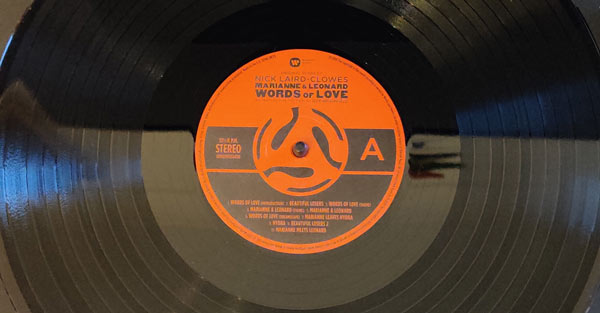
SDE: The label is fantastic. It’s that sort of attention to detail that makes all the difference.
NLC: Completely! And mastering it… I went back to master it with this guy [Steve McLaughlin] and I must have listened to it a hundred times. It’s beautiful.
SDE: So what are you working on at the moment?
NLC: Another Nick Broomfield documentary. He’d finished another film he was making at the same time as this so he couldn’t get me to do the music. But he then said “I’m not happy with the music” – he didn’t use a composer he used library music – so he asked me if I could write a big emotional theme for the end. So I wrote three pieces and he’s cut them in and they’re all in the film, so that’s taking me to Christmas.
SDE: You obviously have a great relationship with Nick?
NLC: We did ‘Battle For Haditha’ [2007 film drama] which is like Cassavetes meets Oliver Stone. He done something [in terms of the music] and he wasn’t pleased with it and I’d met him at a party and I was completely drunk. He said “I think Jeremy Thomas said that maybe you could do something for me…” and I said “sure, absolutely.” So I went home and I went to bed and I thought when I woke up in the morning “Oh god, I feel bad and I hope he doesn’t call…” He’d already left a message, saying would you come down to the South Downs!! I thought, my god I’m not ready for this! But it was brilliant. By this point I’d already done about four films, but with this I watched the rough cut and it was amazing. It’s a real film [drama] not a documentary.
SDE: One of the amazing things about the Marianne & Leonard documentary is Nick Broomfield’s own relationship with Marianne. I was stunned by that. I wasn’t aware at all.
NLC: No one was. In Berlin, at about four in the morning, five in the morning we were taking about people we loved – this was about ten years ago – and I talked about Leonard Cohen and he said “you know, I had an affair with Marianne…” “WHAT?!” Then he went through it all blow-by-blow and when it came to doing this documentary there wasn’t much of him in it, you know how he always likes to cut himself in, and when I first watched it I said “I think there’s needs to be more of you and your relationship” because it’s amazing what she did. He was going to be a lawyer, and she said “you’re not a lawyer, you love photographs, I’m going to introduce you to my friend D.A. Pennebaker…” A lot of that footage in the film was Pennebaker’s and Nick had gone to him and said “can you go into your archives and find that footage of Marianne in Hydra in 1972?” And Pennebaker says “are you fucking out of your mind? I’m 94 years old, if you think I’m going into my archives to find some footage of a girl on a beach shot in 1972…” And then over months he relented and let Nick go in and find it and he used it.
SDE: Nick’s small part in the story adds a whole new dimension to the documentary, it’s incredible.
NLC: It is and I think he did such a good job of expressing the dark side of the sixties. At the beginning people seem to think it’s going to be a hagiography where it’s all going to be about how wonderful this life was, and it shows the other side. I mean, who but Leonard Cohen when he’s told that nobody would release ‘Hallelujah’ and that it’s all over, would go to a monastery where he worked as a cook for three years! He didn’t take Holy Orders until after three years.
SDE: One thing I hadn’t quite appreciated – and the documentary makes this clear – is quite what a commercial success Cohen was in the early 1970s, especially touring, playing big venues with adoring fans.
NLC: Well, he was and he wasn’t. Every album after the first one sold less in America. But in Europe they just adored him. So funnily enough, the film isn’t as big in America but it’s huge in Europe.
Thanks to Nick Laird-Clowes who was talking to Paul Sinclair for SDE.
Nick’s wonderful score to Marianne & Leonard: Words of Love is only available on vinyl (Warners wouldn’t agree to a CD release). We have a few SIGNED copies available on the SDE shop, which you can order using this link, or the button below.
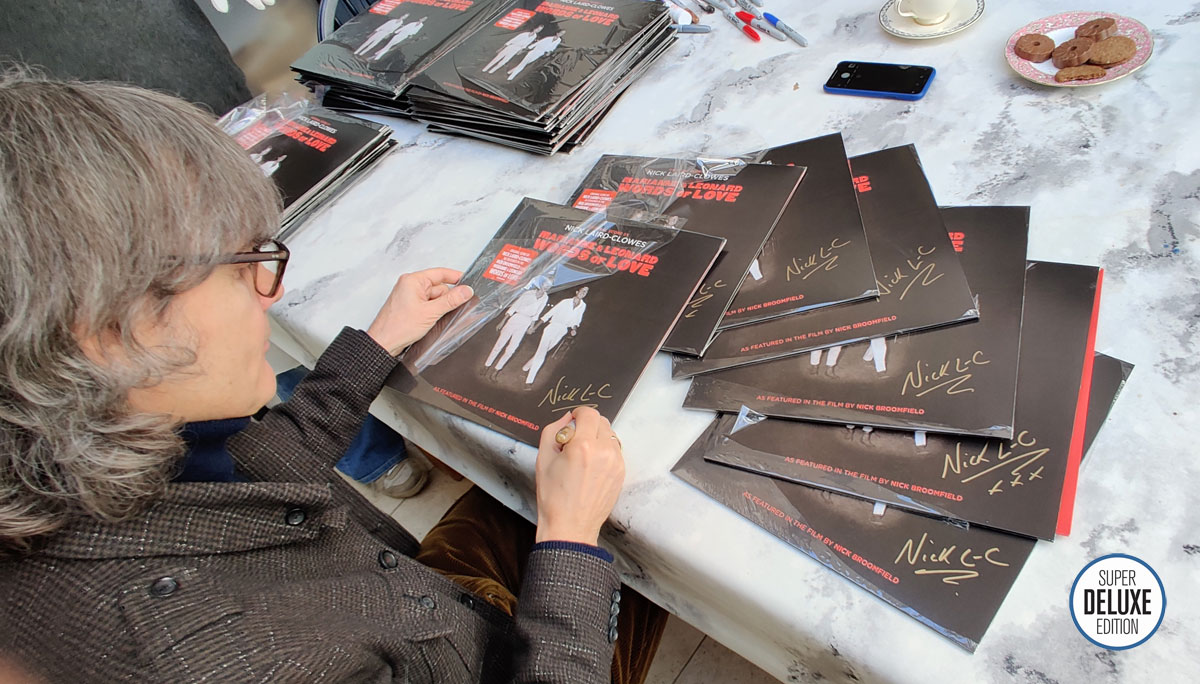
Compare prices and pre-order

Nick Laird-Clowes
Marianne & Leonard: Words of Love (Original Score) [VINYL]
![]()
- Words of Love (Introduction)
- Beautiful Losers
- Words of Love (Theme)
- Marianne & Leonard (Theme)
- Marianne & Leonard
- Words Of Love (Dreamscape)
- Marianne Leaves Hydra
- Hydra
- Beautiful Losers 2
- Marianne Meets Leonard
- Words Of Love (Slowdive)
- On The Roof Terrace
- Marianne & Leonard (Accordion)
- It Won’t Be Long
- Words Of Love (Reprise)
- Life As Art
- Beautiful Losers (Theme)

 Interview
Interview
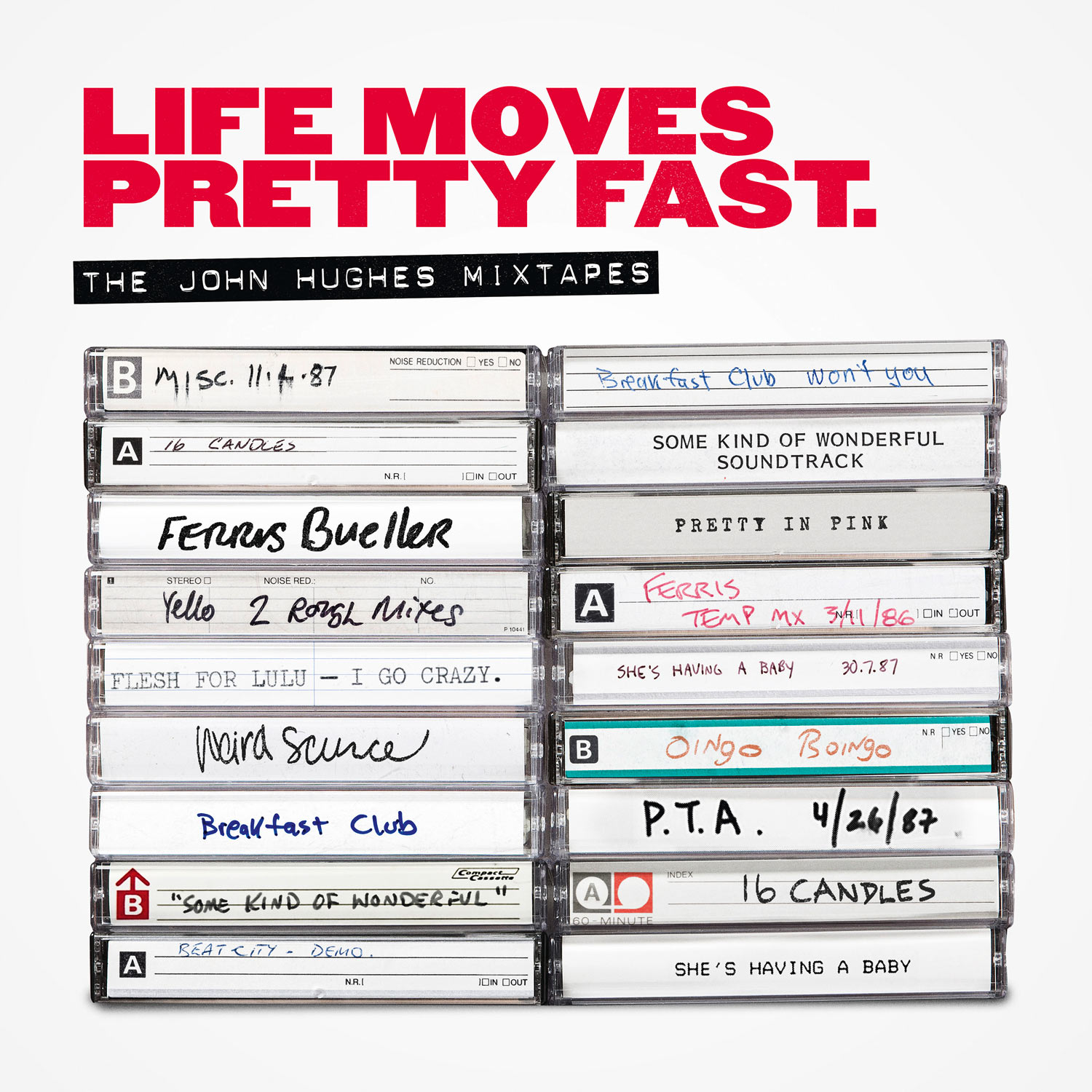
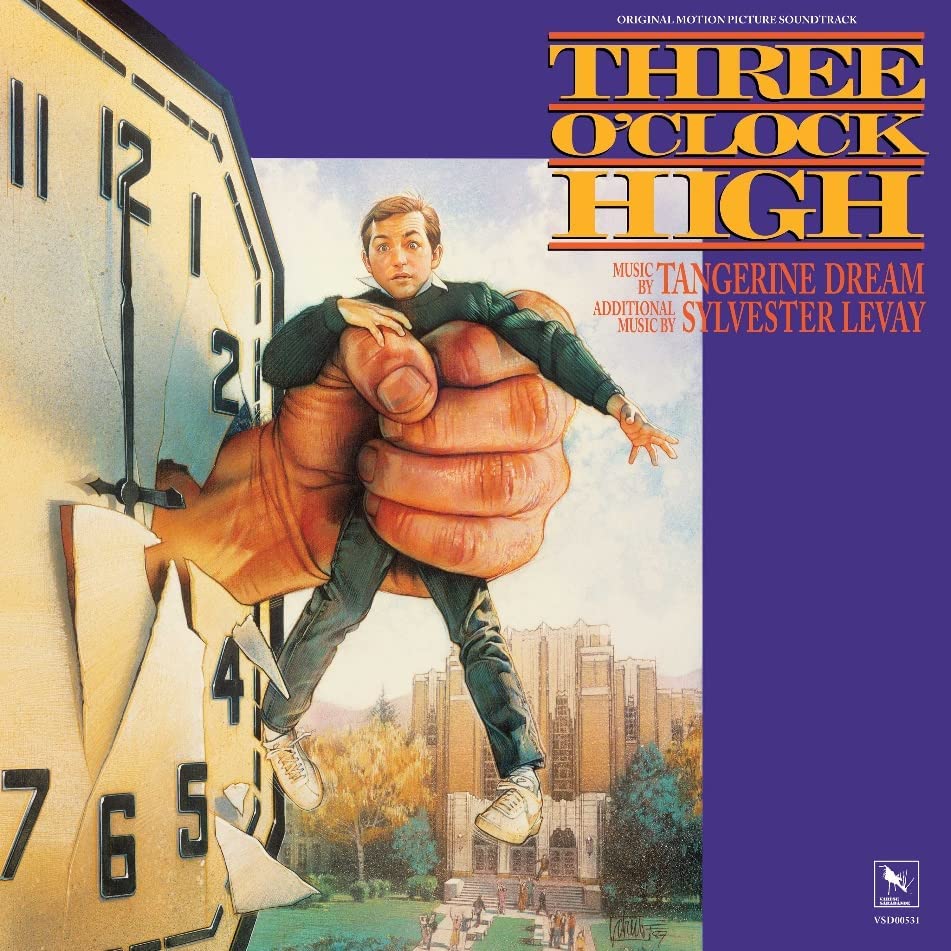
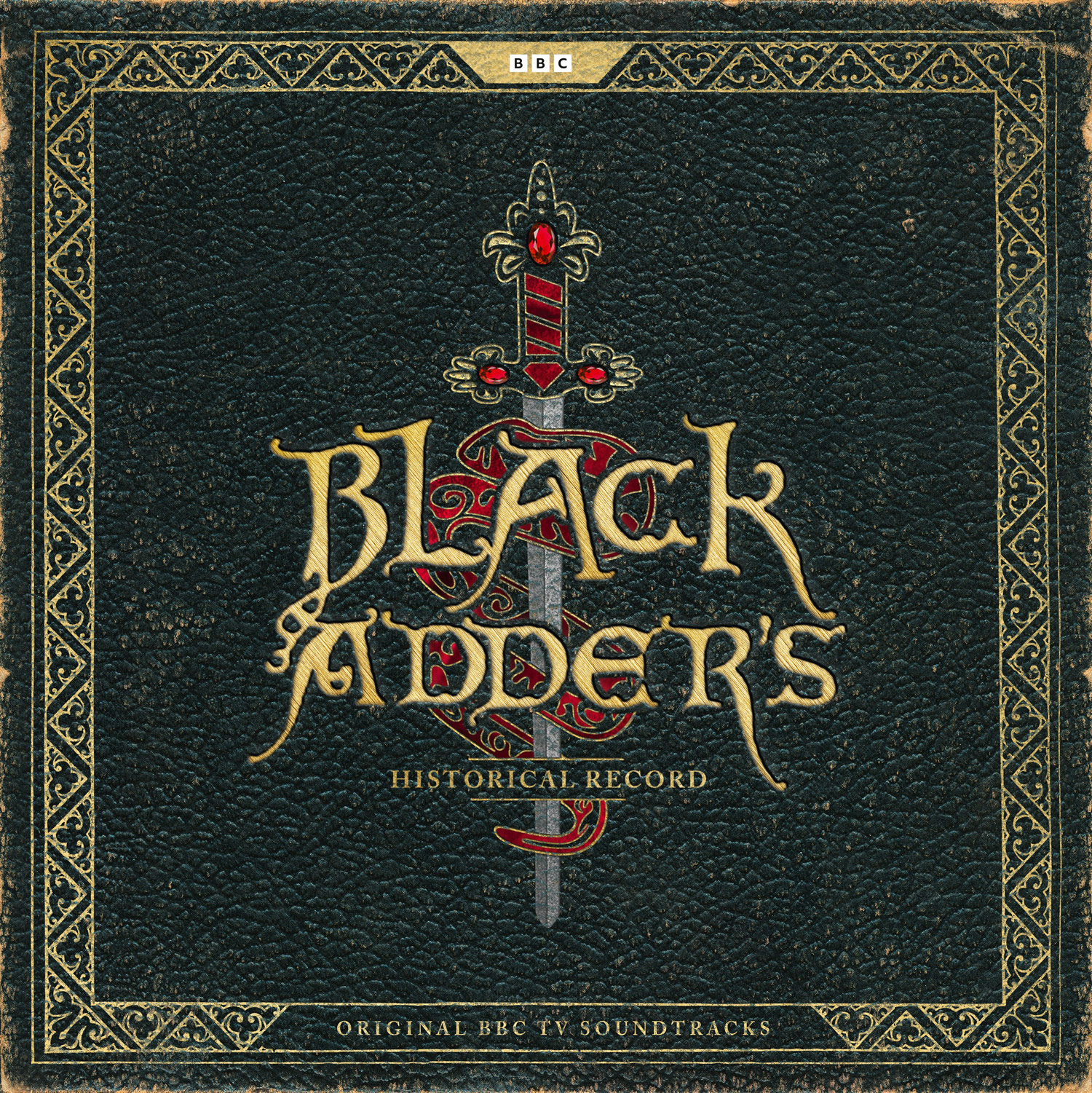
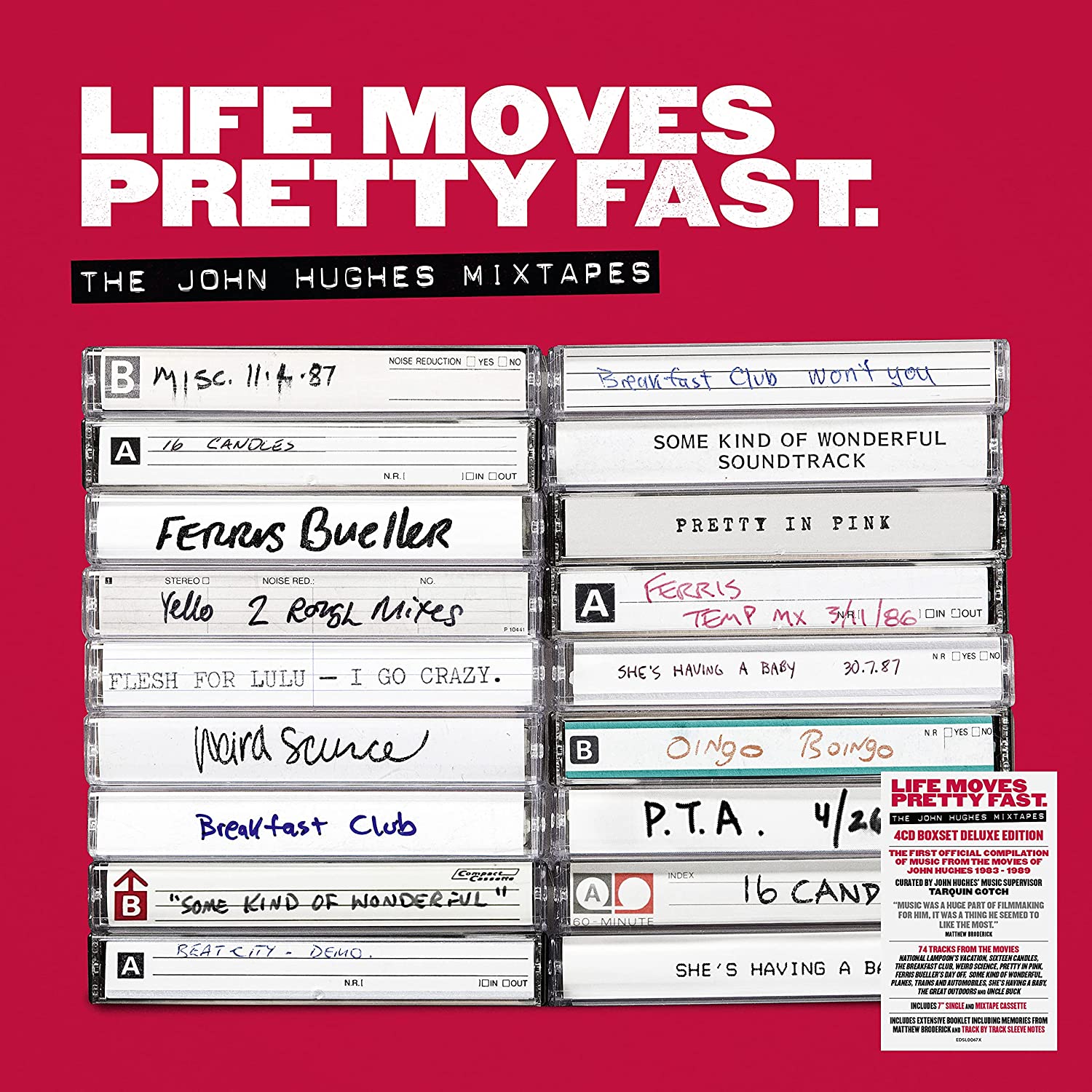
By Paul Sinclair
14